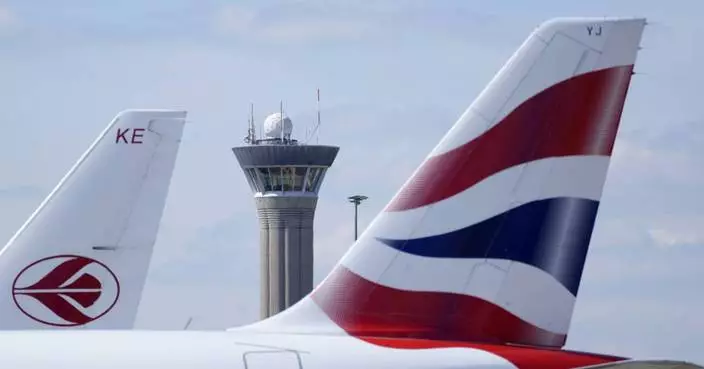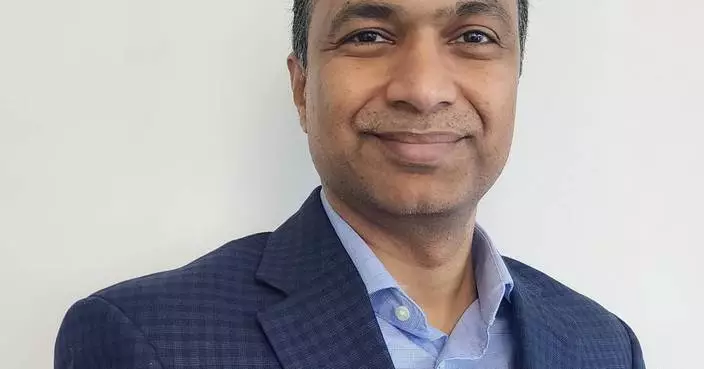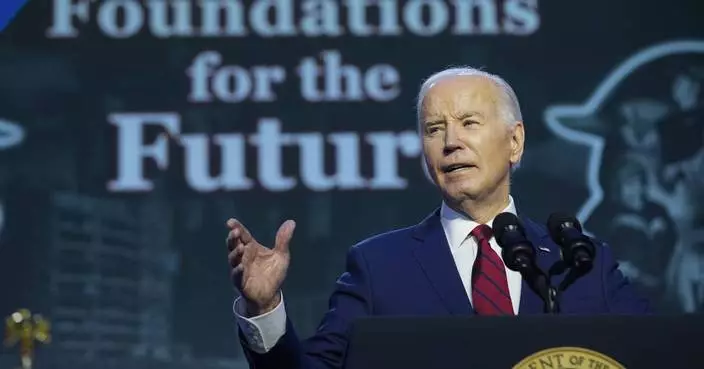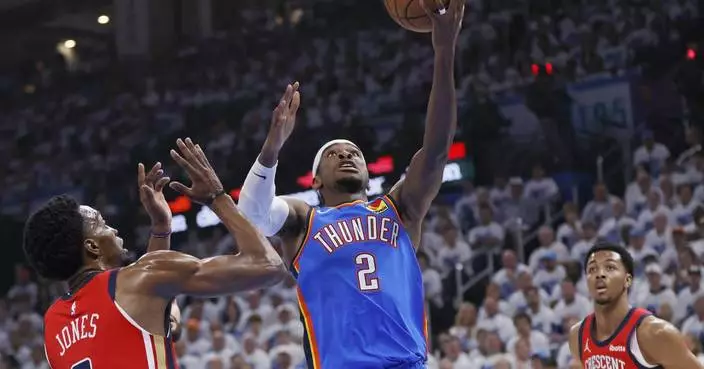To protect one of the highest-profile diplomatic events so far this century, Singapore has enlisted the help of its fearsome Nepalese fighters whose large curved knives, according to custom, must "taste blood" whenever they're drawn.
Wearing brown berets and equipped with body armor and assault rifles, the elite Gurkha police officers are a conspicuous part of the enveloping security force Singapore has deployed for Tuesday's summit between President Donald Trump and North Korean leader Kim Jong Un.
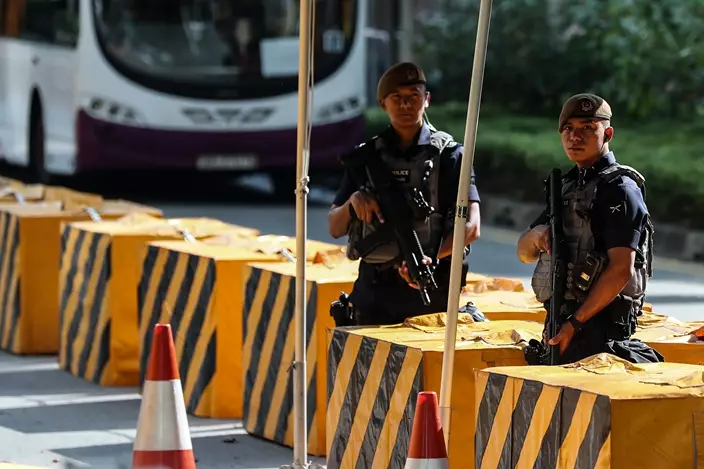
Gurkha police officers stand guard outside the St. Regis Hotel in Singapore, Monday, June 11, 2018, ahead of the summit between U.S. President Donald Trump and North Korean leader Kim Jong Un. (AP Photo/Yong Teck Lim)
The meeting, which could prove to be a crucial moment in the global diplomatic push to resolve the nuclear standoff with Pyongyang, has sent the highly manicured city-state into security overdrive. Trump and Kim have brought their own personal security personnel and heavily armored limousines; Kim's bodyguards have been seen running in formation alongside his massive Mercedes.
Selected among young men from impoverished Nepal, Gurkhas have been part of Singapore's police force since 1949. There are reportedly about 1,800 Gurkha officers in Singapore, and they are a regular presence at high-security events. On Monday, they were seen standing guard at the heavily fortified St. Regis Singapore, where Kim arrived Sunday afternoon.
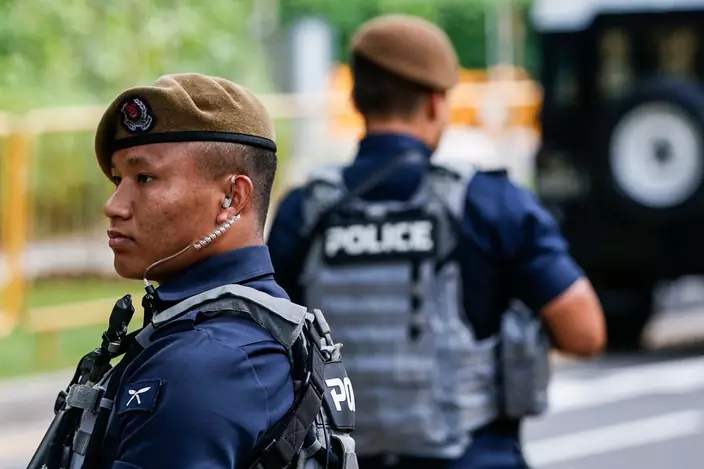
FILE - In this June 10, 2018, file photo, Gurkha police officers guard the perimeter of the Shangri-La Hotel in Singapore ahead of the summit between U.S. President Donald Trump and North Korean leader Kim Jong Un. (AP Photo/Yong Teck Lim, File)
"This is a moment of pride to see the Gurkhas responsible for guarding such an important event," said Krishna Kumar Ale, who served for 37 years in the British army before retiring back home in Nepal. "It shows that we Gurkhas have reached a point where we are trusted with the security of two of the most important people in the world."
In 2015, during the Shangri-la Dialogue, a Singapore summit that includes defense ministers and top security officials from around the world, a Gurkha officer shot and killed a driver after his car breached a series of roadblocks outside the summit's venue. The incident turned out to be drug-related, not an attack.
When asked about the scale of security operations for the summit, Singapore's Law and Home Affairs Minister K. Shanmugam said Sunday that more than 5,000 police had been deployed. The Gurkha Contingent is a special police unit inside the force.
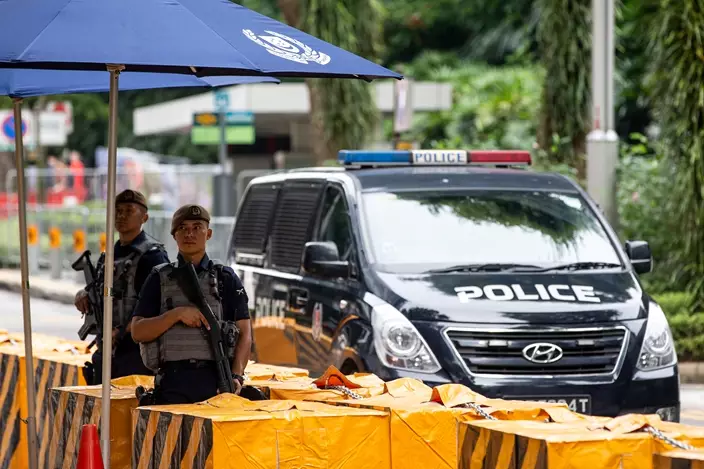
FILE - In this June 10, 2018, file photo, Gurkha police officers stand guard outside the St. Regis Hotel in Singapore ahead of the summit between U.S. President Donald Trump and North Korean leader Kim Jong Un. (AP Photo/Yong Teck Lim, File)
"I think the fact that it had to be put together in two weeks ... added tremendously to the pressure and logistics, the demands. But I think the officers have worked around the clock, we are quietly confident that they have put in place the preparations," he said.
Singapore is not new to hosting high-profile events, including International Monetary Fund and World Bank Group meetings, and Association of Southeast Asian Nations summits in 2007 and 2018.
Gurkhas, whose name derives from the Nepalese hill town of Gorkha, have been deployed in major conflicts and wars since becoming part of the British army in the 19th century. More than 200,000 Gurkhas fought in the two world wars, where they won admiration for their combat skills and bravery, living up to their traditional motto "It's better to die than to be a coward." Gurkhas also fought in the Falklands conflict, the Gulf War, Bosnia, Kosovo and Afghanistan.
The British experienced Gurkhas' fierceness firsthand after suffering heavy losses during their invasion of Nepal. A peace deal signed by the British East India Company in 1815 allowed Britain to recruit troops from Nepal.
After Indian independence in 1947, Britain, Nepal and India reached an agreement to transfer four Gurkha regiments to the Indian army. Former British colonies Singapore and Malaysia have also employed Gurkhas for their police and army, respectively.
In Nepal, getting picked to serve as Gurkha soldiers and officers overseas is seen as a ticket out of poverty. According to Nepal's Gurkha Army Ex-Servicemen Organization, over 10,000 applicants try out every year for about 260 places in the British army's Gurkha units. Many train for months for the selection process, which includes a grueling "doko" race, which involves carrying 25 kilograms (55 pounds) of sand while running a steep 4.2-kilometer (2.6-mile) uphill course.
Along with their modern weapons, Gurkhas still carry the traditional "kukri," a long curved knife which tradition says must "ragat khaikana" — taste blood — once it is drawn.
"That is no longer the current practice ... mostly," said the Gurkhas Australia website.
NEW YORK (AP) — Donald Trump was expected to return to court Thursday morning as witness testimony in his hush money trial enters a third day.
The trial resumes at the same time that the U.S. Supreme Court hears arguments in Washington over whether he should be immune from prosecution for actions he took during his time as president.
At his trial in Manhattan, veteran tabloid publisher David Pecker took the stand earlier in the week, testifying about his longtime friendship with the former president and a pledge he made to be the “eyes and ears” of Trump’s 2016 presidential campaign.
Pecker, the National Enquirer’s former publisher, said the pledge culminated in an agreement to warn Trump’s personal lawyer about potentially damaging stories and help quash them. Pecker said the tabloid ultimately ran negative stories about Trump’s political opponents and even paid $30,000 for a doorman’s silence.
Pecker was expected to return to the stand Thursday.
The testimony was sought to bolster prosecutors’ premise that Trump sought to illegally influence the 2016 election through a “catch-and-kill” strategy to buy up and then spike negative stories. Key to that premise are so-called hush money payments that were paid to porn actor Stormy Daniels and former Playboy model Karen McDougal, along with the doorman.
Prosecutors say Trump obscured the true nature of those payments and falsely recorded them as legal expenses.
He has pleaded not guilty to 34 felony counts of falsifying business records.
The case is the first-ever criminal trial of a former U.S. president and the first of four prosecutions of Trump to reach a jury.
Currently:
— No one is above the law. Supreme Court will decide if that includes Trump while he was president
— Investigator says Trump, allies were uncharged co-conspirators in plot to overturn Michigan election
— Trump trial day 6 highlights: David Pecker testifies on ‘catch-and-kill’ scheme
— Key players: Who’s who at Donald Trump’s hush money criminal trial
— The hush money case is just one of Trump's legal cases. See the others here
Here's the latest:
Donald Trump is accused of falsifying internal Trump Organization records as part of a scheme to bury damaging stories that he feared could hurt his 2016 campaign, particularly as Trump’s reputation was suffering at the time from comments he had made about women.
The allegations focus on payoffs to two women, porn actor Stormy Daniels and Playboy model Karen McDougal, who said they had extramarital sexual encounters with Trump years earlier, as well as to a Trump Tower doorman who claimed to have a story about a child he alleged Trump had out of wedlock. Trump says none of these supposed sexual encounters occurred.
Trump’s former lawyer and fixer, Michael Cohen, paid Daniels $130,000 and arranged for the publisher of the National Enquirer supermarket tabloid to pay McDougal $150,000 in a journalistically dubious practice known as “catch-and-kill” in which a publication pays for exclusive rights to someone’s story with no intention of publishing it, either as a favor to a celebrity subject or to gain leverage over the person.
Prosecutors say Trump’s company reimbursed Cohen and paid him bonuses and extra payments, all of which were falsely logged in Trump Organization records as legal expenses. Cohen has separately pleaded guilty to violating federal campaign finance law in connection with the payments.
David Pecker, formerly the publisher of the National Enquirer, took the stand both Monday and Tuesday and testified about how his longtime friendship with the former president culminated in an agreement to warn Donald Trump's personal lawyer about stories that could damage the White House hopeful's 2016 campaign and help quash them.
Pecker told the court that the agreement followed an August 2015 meeting with Trump, Michael Cohen and Hope Hicks. He further testified that he told the National Enquirer bureau chiefs to be on the lookout for any stories involving Trump and said he wanted them to verify the stories before alerting Cohen.
“I told him that we are going to try to help the campaign and to do that I want to keep this as quiet as possible,” Pecker testified. “I did not want anyone else to know this agreement I had and what I wanted to do.”
Donald Trump faces 34 felony counts of falsifying business records — a charge punishable by up to four years in prison — though it’s not clear if the judge would seek to put him behind bars.
A conviction would not preclude Trump from becoming president again, but because it is a state case, he would not be able to pardon himself if found guilty. He has repeatedly denied any wrongdoing.
Judge Juan M. Merchan has yet to rule on whether or not Donald Trump violated a gag order barring him from making public statements about witnesses in his hush money case.
Merchan held a hearing Tuesday on prosecutors' earlier request that Trump be held in contempt of court and fined at least $3,000 for allegedly violating his gag order.
Prosecutors cited 10 posts on Trump’s social media account and campaign website that they said breached the order, which bars him from making public statements about witnesses in the case.
They called the posts a “deliberate flouting” of the court’s order.
In one post, from April 10, Trump described his former lawyer-turned-foe Michael Cohen and porn actor Stormy Daniels as “two sleaze bags who have, with their lies and misrepresentations, cost our Country dearly!”
Prosecutors are seeking a $1,000 fine — the maximum allowed by law — for each of the first three alleged violations.
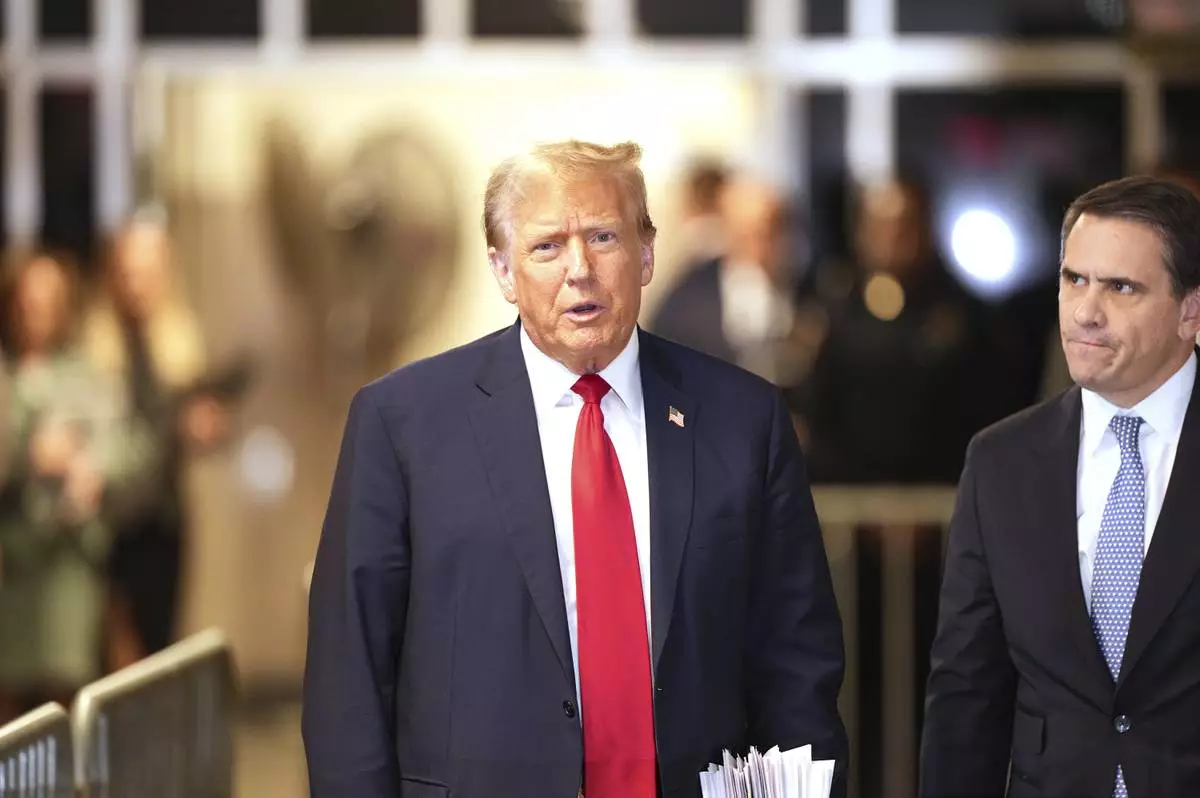
Former President Donald Trump leaves Manhattan criminal court on Tuesday, April 23, 2024 in New York. (Curtis Means/DailyMail.com via AP, Pool)
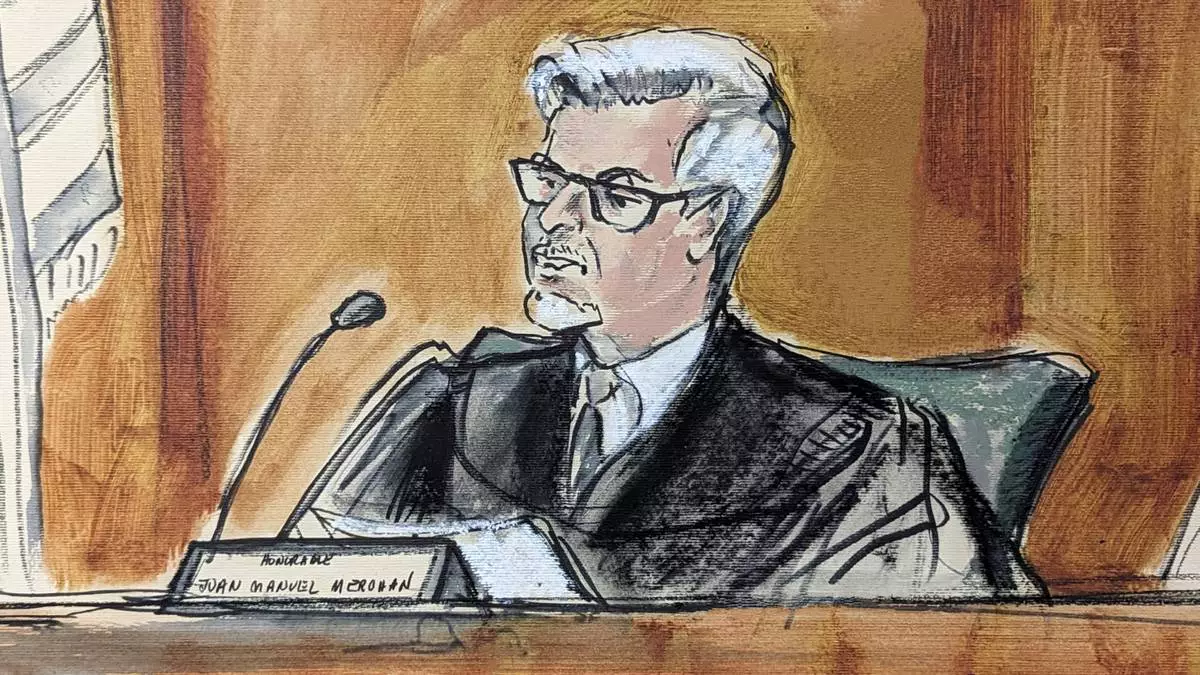
Judge Juan Merchan presides over Donald Trump's trial in Manhattan criminal court, Tuesday, April 23, 2024, in New York. (Elizabeth Williams via AP)
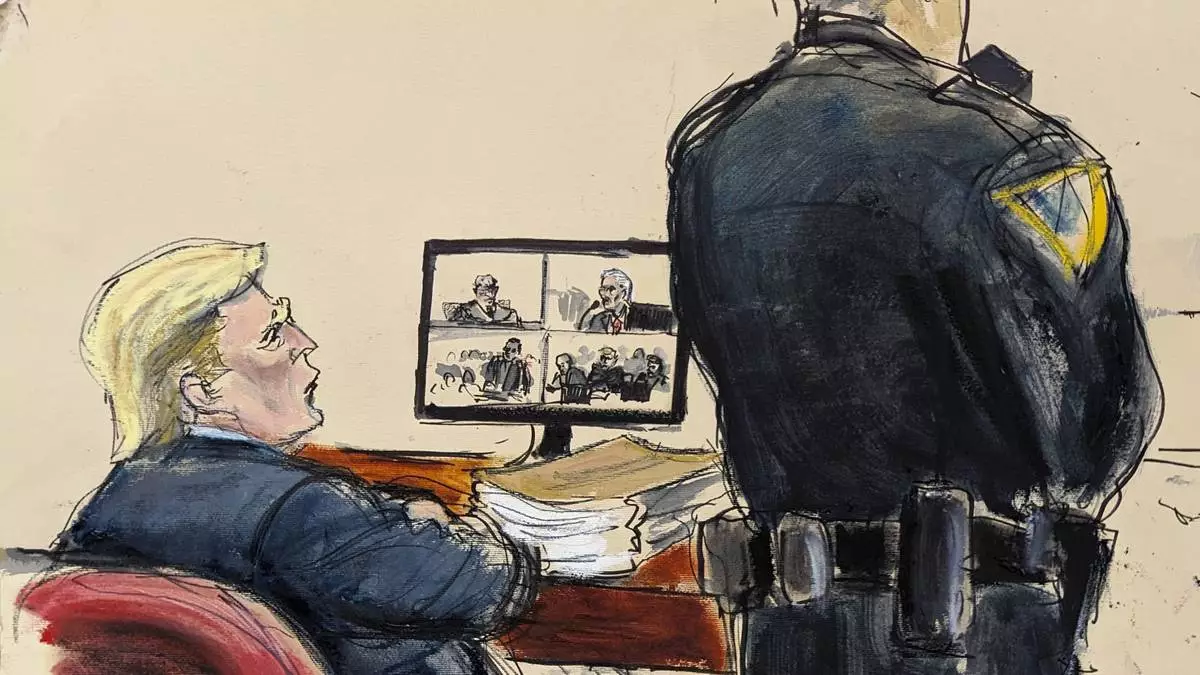
Former President Donald Trump sits at the defense table while David Pecker, shown on the video screen, testifies about Karen McDougal in Manhattan criminal court, Tuesday, April 23, 2024, in New York. (Elizabeth Williams via AP)
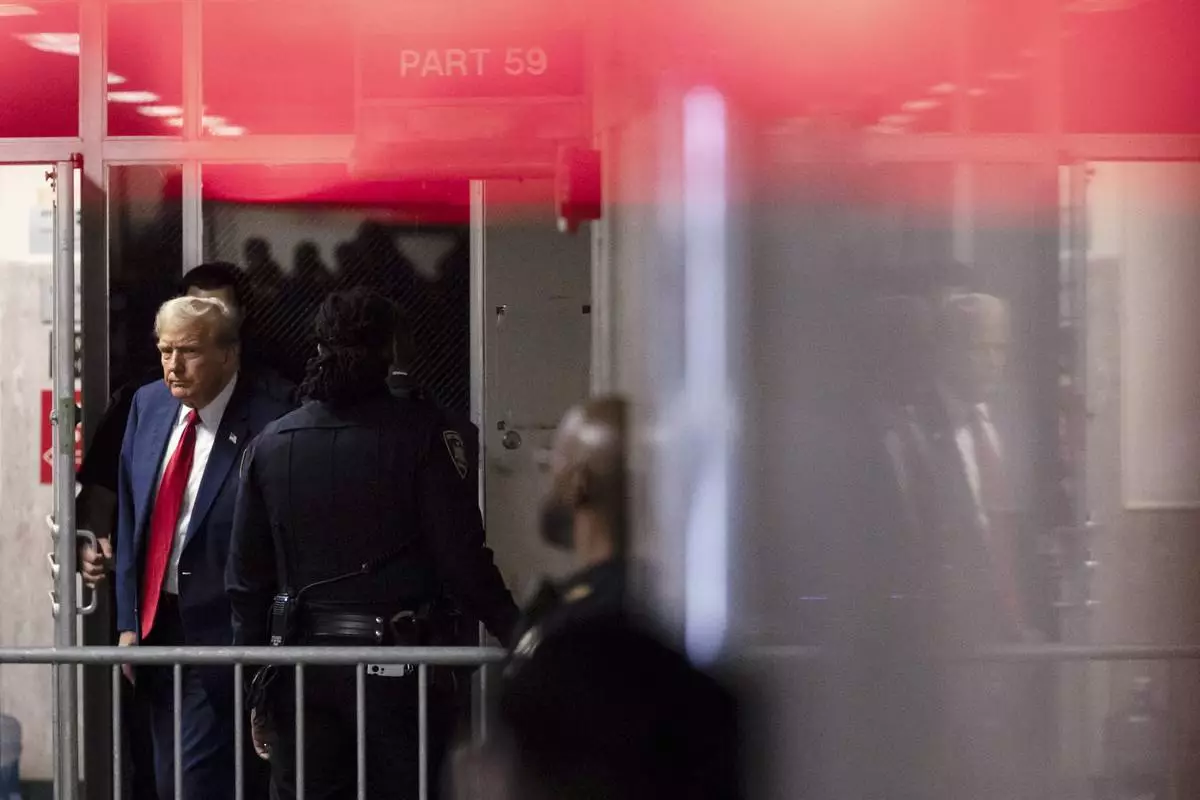
Former President Donald Trump leaves courtroom at Manhattan criminal court, Tuesday, April 23, 2024, in New York. (AP Photo/Yuki Iwamura, Pool)










